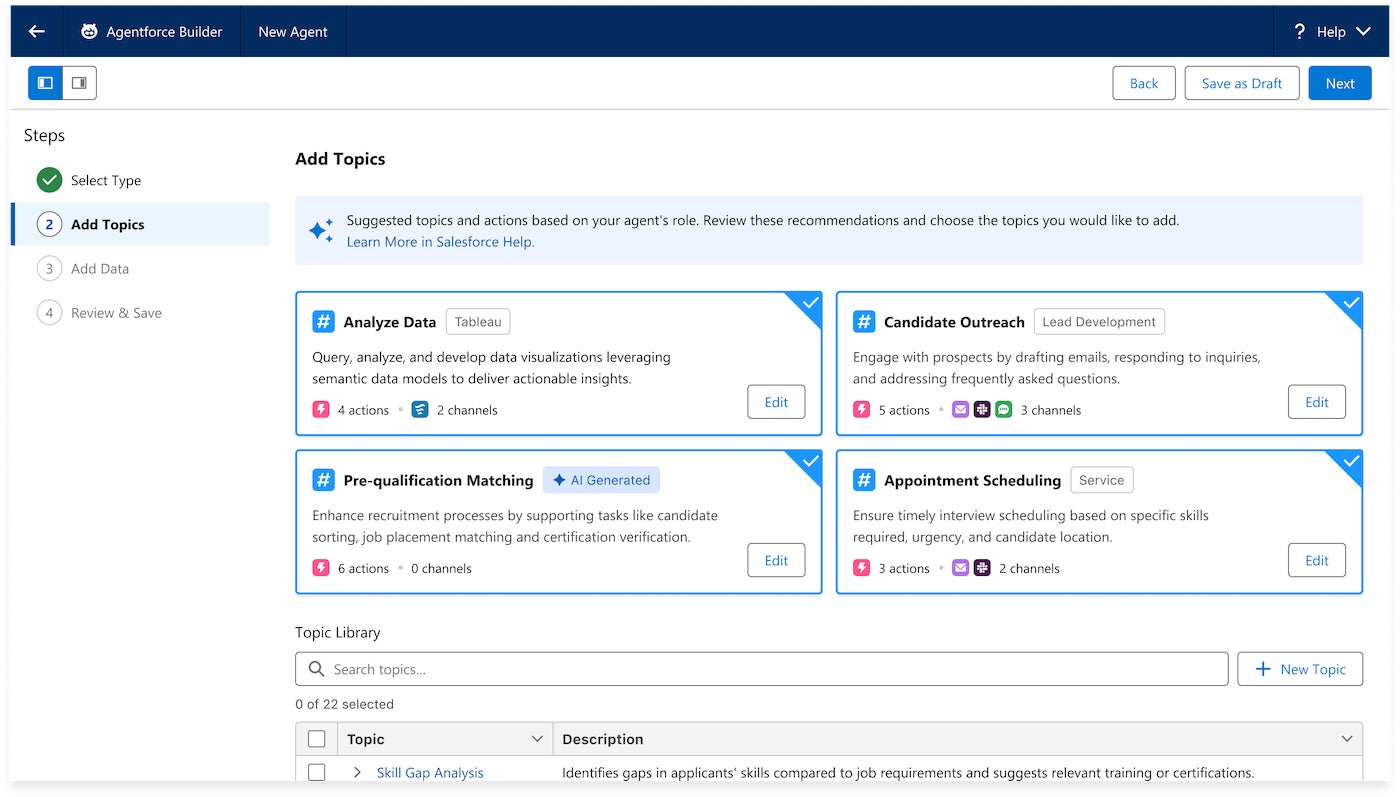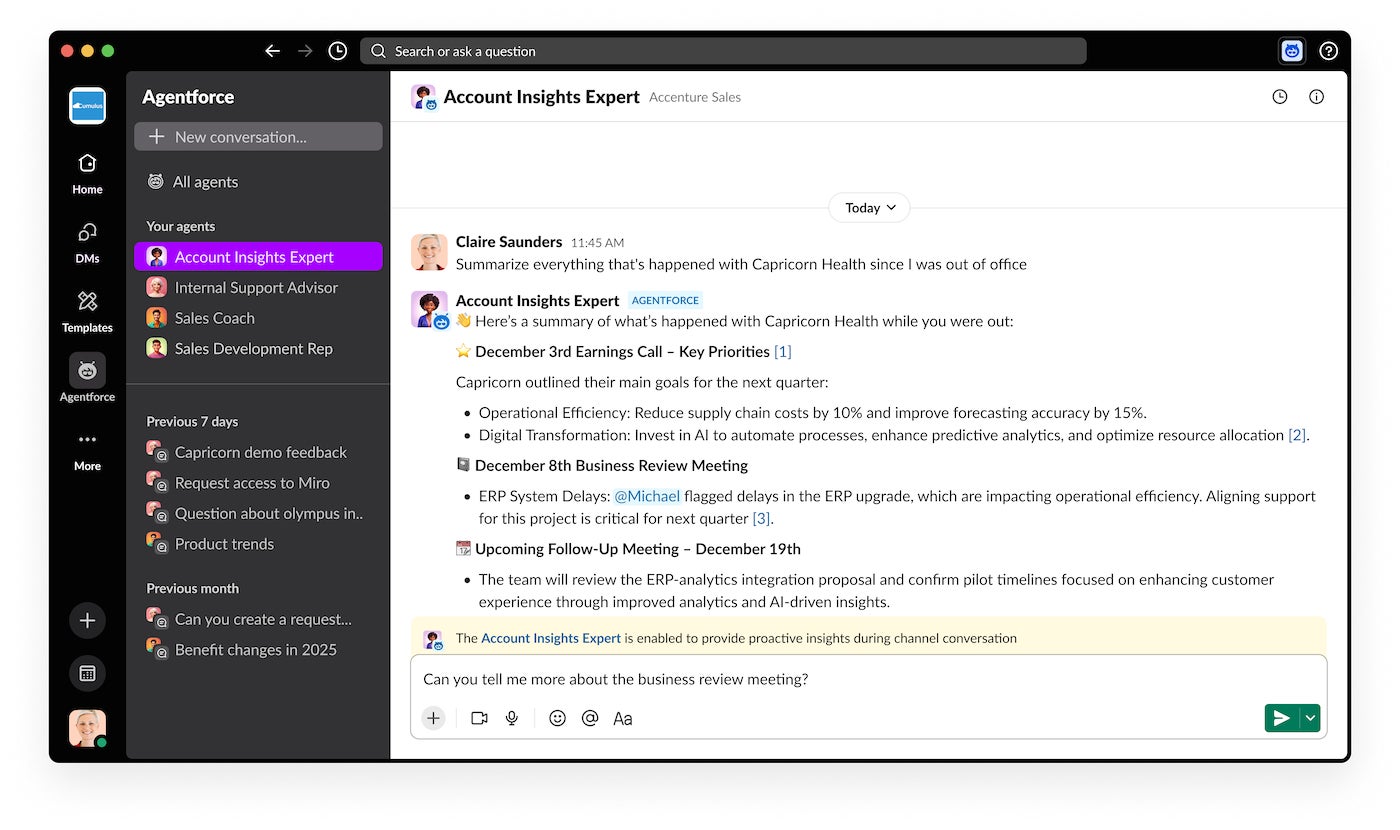On Dec. 17, Salesforce unveiled Agentforce 2.0, the latest iteration of its AI-driven platform. It is designed as a customizable “team” of semi-autonomous AI agents.
Agentforce 2.0 includes enhanced reasoning and data retrieval capabilities that enable AI to respond to complex questions. Salesforce describes Agentforce 2.0 as “the digital labor platform for enterprises,” offering a “limitless” workforce powered by AI agents. These agents can be deployed across any department, equipped with a new library of pre-built skills, and can take action across systems or workflows.
“Humans with agents drive customer success together,” Salesforce CEO Marc Benioff said during a livestreamed presentation.
Agentforce 2.0 will be released in full in February 2025. However, users can begin deploying Agentforce 2.0 in Slack in January.
What’s new about Agentforce 2.0?
Through Agentforce 2.0, users can pull from a library of agent “skills” — AI agents designed for specific tasks — or build their own using natural language prompts. These agents can execute multi-step plans and follow “if/then” instructions, offering flexibility across various workflows.

Pre-built skills and workflow integrations allow for more effective customization. Agents built through Agentforce can seamlessly connect to tools like CRM, Slack, Tableau, Mulesoft, and Salesforce’s AppExchange.
New, pre-built skills include:
- Sales Development.
- Sales Coaching.
- Marketing Campaign.
- Commerce Merchant.
In Tableau, Skills for Analytics and Insight provide visualizations to track and analyze how well agents perform.
Slack integration is another key highlight. With Slack Actions, users can automate updates by setting an agent to send project updates via direct message.
Some of these features are already available:
- Tableau Semantic Layer, Skills for Sales Development, and Skills for Sales Coaching are available now. The latter two add $2 per conversation to your Salesforce bill.
- Skills for Tableau will launch on Dec. 18.
Agent Builder provides a solution for customers who don’t find what they need among the pre-built agents. Using natural language prompts, users can design their own agents. Salesforce offered “’Onboard New Product Managers” as an example of a custom prompt. Agent Builder will also include pre-built Slack actions.
How does Agentforce 2.0 integrate with Slack?
In Slack, employees can message or mention the Agentforce agents just as they would a coworker. Users will also find a new Agentforce Hub within Slack.

Generative AI enables Slack Enterprise Search, a new way to consider context from Slack DMs, channels, and canvases.
Agentforce in Slack, Slack Actions in Agent Builder, and Slack Enterprise Search will all be available to the general public in January.
SEE: Organizations need to understand the differences between types of AI to avoid unnecessary expenses — and sometimes, the job doesn’t call for generative AI.
How does the Atlas Reasoning Engine enhance Agentforce 2.0?
“Reasoning” is the next frontier in generative AI, with models like Amazon Nova performing complex operations slightly more slowly than their peers to generate deeper answers. Salesforce’s contribution is advanced reasoning and retrieval-augmented generation in Atlas Reasoning Engine, the model behind Agentforce.
Salesforce’s example of a question that might benefit from advanced reasoning was, “What would be the right investment vehicle for my child’s college fund based on my current income and risk preferences?”
With RAG, Agentforce can pull unstructured metadata from elsewhere in the Salesforce Platform. Essentially, RAG checks the AI’s work.
“Unity Environmental University is leveraging Salesforce’s Agentforce to expand our support beyond routine inquiries, allowing our employees to focus on learners who need more personalized guidance,” wrote Melik Khoury, president and CEO of Unity Environmental University, in a press release from Salesforce. “By integrating agentic AI into our workflows, we can quickly address standard questions like financial aid details or class registration while freeing our team to engage more deeply with students.”
Enhanced reasoning and RAG in the Salesforce Platform will be open for business in February.
Salesforce goes all-in on AI
Salesforce has committed significantly to integrating generative AI into its products, including the enthusiasm for Agentforce that kicked off in September.
“In the next few years, I’d expect we’ll be able to deliver more agentic experts,” Claire Cheng, VP of machine learning and engineering for Salesforce AI, said in a press release.”The reasoning engine should be one of the first factors enterprise organizations consider when comparing digital labor options.”

